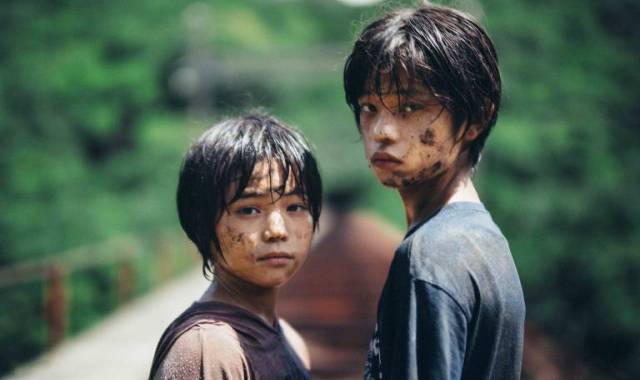“Monster,” or originally “Kaibutsu,” is a Japanese drama directed by the respected filmmaker Hirokazu Koreeda (I’ve written about his films “Shoplifters” and “Broker”), based on the screenplay by Yūji Sakamoto. The story follows single mother Saori (Ando Sakura) who confronts her son’s teacher at school after noticing disturbing changes in her son’s behavior. The film premiered on May 17th last year at the 76th Cannes Film Festival, where it won the award for Best Screenplay.
The director brings his humanistic lens to the fundamental and captivating mystery in this story revolving around a growing scandal at school, revealing three different perspectives on these events and gradually uncovering the underlying story of emotional power and moral certainty. This is a film that seems rich from the start as questions of truth and trust are subtly revealed amidst character-focused drama, but the screenplay only becomes more intricate as the story progresses.
Saori is a widowed single mother raising her son Minato as best she can. Things seem as good as they can be, with the boy still grieving for a father he never knew. He hopes to live up to the standard the man left behind, cares for her mother as best she can, and wonders if his dad has been reincarnated. For her part, Saori works, keeps the house in order, and looks after her son’s well-being.

The plot thickens when she notices Minato’s behavior starting to change in strange, but initially subtle ways. The boy asks about hypothetical scientific experiments involving pig brain transplantation into humans, his water bottle is filled with dirt and some strange, hard, unidentified object which Minato simply says was part of a science experiment. At one point, Saori runs errands, returns home, and finds her son still leaning forward in his chair, reaching for an eraser he dropped just before she stepped out the door.
To make matters worse, Minato comes home from school with random injuries, mostly bruises and cuts, and the boy won’t say anything about how he got them. Previously curious, talkative, and energetic, he has become very quiet. Something must be happening at school, and eventually a name emerges: Hori, Minato’s homeroom teacher. There are rumors around town about this man being seen with a woman from the local hostess bar, and it’s deemed tasteless for a teacher to engage in such activities. Moreover, there’s something odd and somewhat eerie about his demeanor, his wide but empty smile, and his loner status.
The screenplay is divided into three parts, with the first taking the mother’s point of view, the second delving into the lonely life of the accused teacher, and the third offering a perspective I won’t reveal here, but left the weakest impression on me this time. This is a mystery moving through time, showing us events as one character sees them, only to fill in the missing gaps as experienced or witnessed by one of these other characters.
In addition to directing the film, Koreeda is credited as the editor, quite skillfully using sound, visuals, props, and even clothing to keep us fully aware of where we are on the narrative timeline. He takes the opportunity to provide some surprises, allowing us to discover some kind of cause-and-effect progression we may not have considered. This is a significant and completely impressive feat, considering the attention to detail demanded of a filmmaker in planning, setting up, and editing the entire project. It’s no wonder Koreeda, who clearly understands the rhythm of this story and its emotional core, entrusted himself with the final editing of the film.
So much of this, after all, lies in what is revealed and when, what is hidden and why, and how the actions and secrets of the characters speak equal amounts about who these people are, what truly matters to them, and how much they struggle to be honest about it. For Saori, she is first and foremost Minato’s mother, and her main driver is to ensure her son is protected from harm. We understand this completely as the actress’s subdued performance is filled with such quiet fierceness when her complaints about the teacher are mostly ignored by the school principal – is this some kind of cover-up, and if so, how can Saori cut through it to achieve any justice for her son?
However, this is only the first part of this story. The second follows Hori in his determination to be a good teacher, as well as his sad and lonely home life. Both are undermined by an accusation of abuse, which he privately but firmly denies, yet must suggest to his mother as a misunderstanding. From his perspective, Minato is not innocent, especially when it comes to his treatment of Jori, a boy shorter than his classmates whom his peers mock as an “alien” – Minato always seems to be there whenever the bullying of Jori becomes particularly bad.
All of this is crucial, even if some of it seems like a digression from the real truth of who Minato might be, how he’s changed or not changed, and what might be causing his erratic and increasingly dangerous actions. The information pieces together a complicated puzzle not only of the case at hand but also of human behavior, societal expectations, and how people learn to doubt, reject, and even despise themselves. Contradictory perspectives suggest that everyone is occasionally preoccupied with their own problems and attempts to shift blame, so no one considers someone else’s viewpoint or, in this case, the truth that’s there if someone truly decides to seek it.
“Monster” is a Japanese film with perspective shifts in the style of “Rashomon” that possesses a fine sense of dramatic mystery and a significant degree of empathy for its characters.
